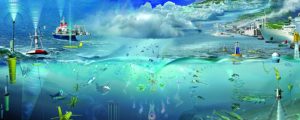Interagency Ocean Observation Committee (IOOC)
The Interagency Ocean Observing Committee (IOOC) is currently managed by the Consortium for Ocean Leadership. More information about the IOOC can be located on the official IOOC website.
IOOS Summit 2012
The IOOC convened the U.S. IOOS Summit on November 13-16, 2012. The Ocean.US Workshop Proceedings in 2002 set the stage for the nation’s first Integrated Ocean Observing System. Ten years later, IOOS has evolved significantly to meet the nation’s ocean observing needs. With the foundation of an integrated system now in place, the ocean observing community can begin developing a comprehensive ocean observing plan that addresses technical, scientific, and management components for the coming decade. The U.S. IOOS Summit Report is posted on the IOOC website at: www.iooc.us/summit.
National Ocean Council (NOC) and The National Ocean Research Leadership Council (NORLC)
While the ICOOS Act officially names the NORLC as the primary body responsible for IOOS policy coordination and oversight, that National Ocean Council is currently carrying out this role through the Deputy-level Committee. The NORLC, or the NOC in this case, is charged with approving and adopting comprehensive IOOS budgets, and ensuring IOOS is well coordinated with other domestic and international earth observing activities like GOOS, the Global Ocean Observing System and GEOSS, the Global Earth Observation System of Systems. In addition, this body is required to promote intramural and extramural research and development, as well as a process to transition developing technology methods into IOOS System operations.
National Oceanographic Partnership Program (NOPP) and the NOPP Biodiversity Ad-Hoc Group
The National Oceanographic Partnership Program (NOPP) coordinates and develops collaborative ocean research efforts among Federal, state and tribal governments, academia, private industry, and NGOs. NOPP engages federal agencies on leadership and coordination of ocean research and education initiatives. Formerly part of the Interagency Working Group on Ocean Partnerships (IWG-OP), NOPP transitioned in 2015 to an independent interagency committee that coordinates with the Subcommittee on Ocean Science and Technology (SOST) to identify, facilitate, and foster engagement on priority interagency ocean research projects through engagement with representatives from Federal agencies, SOST interagency working groups, and other appropriate venues.
The NOPP Biodiversity Ad-Hoc Group became a sub-committee of the IWG-OP (now NOPP) in 2008. The group is co-chaired by US IOOS, NASA and BOEM and meets quarterly to address a range of topics such as advancing the US and global Marine Biodiversity Observation Network (MBON); leveraging investments in biological observing, technology and science; and strengthening accessibility of biological data. Standing agenda items include activities of the Ocean Biogeographic Information System (OBIS) and the US Animal Telemetry Network, as well as updates from the deep sea corals and ‘omics communities.
IOOS has consulted regularly with the NOPP since 2009 to coordinate and contribute to interagency funding announcements on a range of topics, advise and co-sponsor community-wide discussions on MBON development, and gather input on directions for marine sensor technology developments. In 2010, NOAA published the first NOPP-IOOS funding announcement to further development of the regional coastal and ocean component of IOOS and address areas of mutual interest. In 2013, NOAA published the first NOPP-MBON funding announcement to launch demonstrations towards a sustained MBON and long-term biological observations for the US (http://www.nopp.org/ and http://www.nopp.org/about-nopp/committees/nopp/).
 Official websites use .gov
A .gov website belongs to an official government organization in the United States.
Official websites use .gov
A .gov website belongs to an official government organization in the United States. Secure .gov websites use HTTPS
A lock or https:// means you’ve safely connected to the .gov website. Share sensitive information only on official, secure websites..
Secure .gov websites use HTTPS
A lock or https:// means you’ve safely connected to the .gov website. Share sensitive information only on official, secure websites..
